Nobel Peace Prize Awarded To Iranian Activist Amid Her Hunger Strike

The Nobel Peace Prize ceremony honoring Iranian activist Nargess Mohammadi took place in the Norwegian capital of Oslo while she is on hunger strike in prison.

The Nobel Peace Prize ceremony honoring Iranian activist Nargess Mohammadi took place in the Norwegian capital of Oslo while she is on hunger strike in prison.
Mohammadi, a human rights activist currently incarcerated, was absent from the ceremony, with her family accepting the award on her behalf.
The Nobel Peace Prize ceremony on Sunday coincided with Human Rights Day. On October 6, as announced by the Nobel Committee, Mohammadi was awarded the Nobel Peace Prize for 2023 "due to her struggle against injustice towards Iranian women and her efforts to advance human rights and freedom for all."
In the absence of the imprisoned human rights activist, the prize was received by her husband, Taqi Rahmani, and their twin children, Kiana and Ali.
In a pre-ceremony interview with Iran International, Ali Rahmani stated that his mother, who is currently in prison, should have been present at the award ceremony. He and his sister, Kiana, aim to represent their mother's voice.
Kiana also expressed admiration for individuals of similar age “who took to the streets and sacrificed their lives for the cause.” She emphasized that the Nobel Peace Prize is not only for her mother but also for all Iranian women.
Narges Mohammadi, born in 1972 in Zanjan, holds a degree in applied physics. She commenced civil and political activities during her university years. Over the years, she has received several international awards, including the Sakharov Prize from the American Physical Society in 2018, the International Press Freedom Award in 2016, and the Alexander Langer Award in 2009.
In recent years, Mohammadi has faced multiple arrests, trials, and many years in prison for her human rights activities. She was last arrested in 2021 and has been in Evin Prison since then.
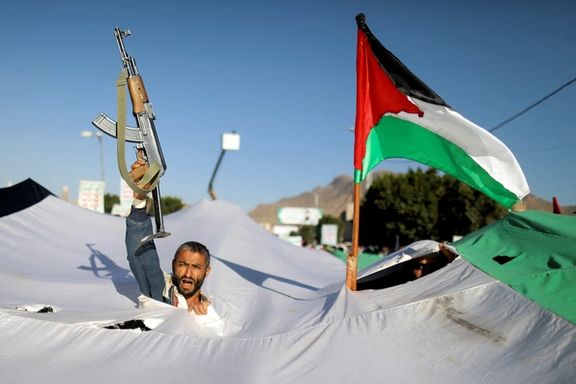
After several weeks of sporadic attacks on Red Sea shipping, Iran-backed Houthis of Yemen have threatened all ships in addition to US and Israeli vessels.
Houthis’ Information Minister Dhaif Allah (Dhaifullah) Al-Shami said Sunday that their forces will attack sensitive targets of Israel and US in the region if they move to act against the Houthis. Bragging about their attacks on vessels, he claimed that these are in response to Israel's offensive in Gaza.
Palestinian Islamist militia Hamas, another Iran-backed group, declared war on Israel on October 7 in a surprise attack that they codenamed Operation Al-Aqsa Flood, killing over 1,200, mostly civilians and taking about 250 hostages. In retaliation, Israel has been pounding the enclave to uproot Hamas, which has made the war exceedingly bloody hiding deep among the civilian population and underneath the coastal sliver’s non-military facilities.
Al-Shami's remarks came a day after General Yahya Saree, the military spokesman for Houthi rebels, warned that they would target all ships heading to Israel, regardless of their nationality. He also warned all international shipping companies against dealing with Israeli ports. "If Gaza does not receive the food and medicine it needs, all ships in the Red Sea bound for Israeli ports, regardless of their nationality, will become a target for our armed forces."
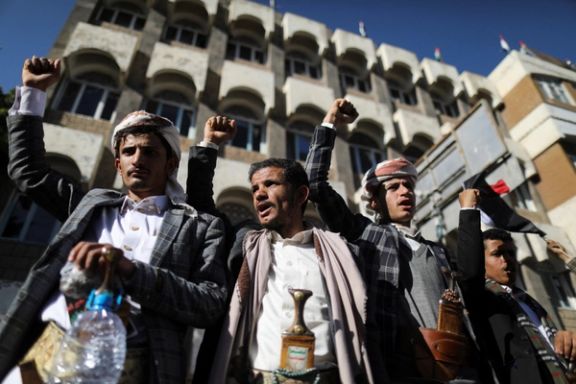
The Houthis have attacked and seized several Israeli-linked ships in the Red Sea and its Bab al-Mandab strait, a sea lane through which much of the world's oil is shipped, and fired ballistic missiles and armed drones at Israel.
According to Israeli media, Prime Minister Benjamin Netanyahu has reportedly told US President Joe Biden and German Chancellor Olaf Scholz that if they do not take military action against the Houthis soon, Israel will. The US government’s reaction to attacks on vessels in the Red Sea has been a mixture of blaming Iran and downplaying the threat to the US Navy.
The New York Times reported on Saturday that senior Israeli defense officials have intelligence that Iran is urging their regional allies, such as Hezbollah and the Houthis, to increase their attacks and pressures against Israel.
Al-Shami described the threat by the Houthis’ military spokesman as “historic,” claiming that targeting ships belonging to other countries is the next phase to put pressure on Israel after the first phase of targeting Israeli-linked ships. “This statement is a historic declaration for Yemen; a country that has been under siege and attack, facing ruthless and rebellious forces for nine years. Yet today, it rises in support and assistance to the oppressed in Gaza and throughout Palestine.”
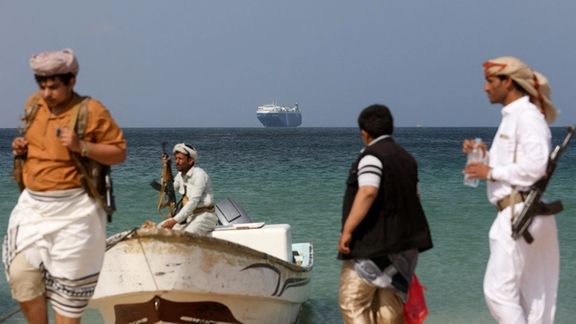
Earlier in the day, France’s defense ministry said a French warship operating in the Red Sea has shot down two drones that were launched at it from the Yemen coast. On Friday, British officials warned shipping in the Red Sea to “exercise caution.” In another one of the latest incidents, three commercial vessels came under attack in international waters last week, prompting a US Navy destroyer to intervene. The Houthis, which rule much of Yemen and its Red Sea coast, also seized last month a British-owned cargo ship that had links with an Israeli company.
The Houthis are one of several Iran-backed militant groups in the Middle East. They have been effectively in a state of war with Saudi Arabia since 2015 and have claimed support for Palestinians since the Hamas terror attack on Israel on October 7. Iran supports Hamas but says it did not play any role in the Islamist militants' terror attack that triggered the current crisis. Tehran also denies involvement in the recent attacks on vessels in the Red Sea. Iran also backs the Hezbollah, a Lebanese militant group that has deep ties with Hamas and Islamic Jihad, another Palestinian faction in Gaza that is also backed by Iran.
Iran's current war strategy is employing proxy forces to target Israel, Israeli assets, and US military installations in the region. Since the October 7 attack, Tehran has been warning of the spillover of the conflict in case of a regional escalation, but at the same time cheers attacks against Israel and the United States.
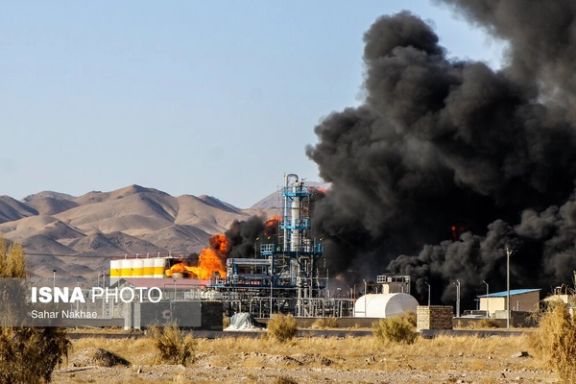
Refinery reservoirs in the Birjand special economic zone in eastern Iran caught fire on Sunday, as reported by Iran's state media.
The Islamic Republic News Agency (IRNA) conveyed that firefighters were promptly dispatched to combat the flames at the mini-refinery, with visible smoke extending several kilometers.
Authorities issued an evacuation order for a nearby factory as firefighting forces worked relentlessly to control the situation. Mohammad Ali Akhoundi, the director-general of Iran's South Khorasan Province's crisis management department, noted that "operational vehicles" were mobilized to extinguish the flames, emphasizing the urgency of the response due to the potential threat to life.
The cause of the incident remains unknown, though similar events in the past have often prompted speculations of domestic or foreign sabotage. Notably, numerous unexplained explosions and fires have occurred at various Iranian military, nuclear, and industrial facilities, including pipelines and refineries, since mid-2020.
On January 28, a significant fire erupted at an Iranian military industrial factory, suspected to be the result of a drone strike in Esfahan.
While authorities have not provided comprehensive explanations for the incidents, they have attributed several high-profile sabotage attacks on facilities to Israel. However, Israel has not officially claimed responsibility for any of the events.
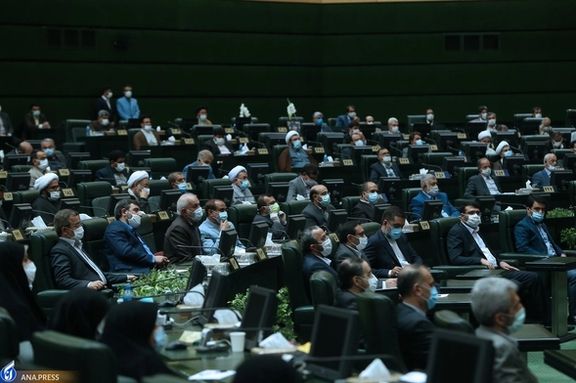
Iran's parliament has given its approval for a bill aimed at fostering cooperation with Russia in the realm of information security, as both countries are accused of extensive cyber attacks.
The bill, which implements an agreement signed three years ago by former Iranian Foreign Minister Mohammad Javad Zarif and his Russian counterpart Sergei Lavrov, received the green light from parliamentarians.
Comprising nine articles, the bill focuses on combating cyber threats, fortifying information security measures, and fostering collaboration between Iran and Russia. A notable clause in the legislation addresses the exchange of information and cooperation in prosecuting criminal offenses between the two nations.
Before the parliamentary vote, Abolfazl Amouei, spokesperson for the National Security and Foreign Policy Committee, advocated for the bill, citing the emergence of cyber threats against the two countries. He stressed that the collaboration between the Islamic Republic of Iran and the Russian Federation, as outlined in the bill, provides responsive solutions to counter these evolving threats.
However, Hosseinali Haji Deligani expressed his opposition to the bill, stating, "The terrorist objectives for the Islamic Republic of Iran and Russia differ, and the bill lacks specificity regarding the nature of collaboration. In essence, the sections are ambiguous, failing to provide guidance on how to proceed if the exchange of information contradicts our laws."
In recent years, Tehran and Moscow have strengthened their political, military, communication, and cyber ties, prompting concerns among Western countries and their allies. Microsoft's Threat Analysis Center (MTAC) recently reported that Russia, Iran, and China are likely planning to influence upcoming elections, including those in the United States in 2024. The report warned of potential targeting of "election infrastructure, campaigns, and voters" by authoritarian regimes.
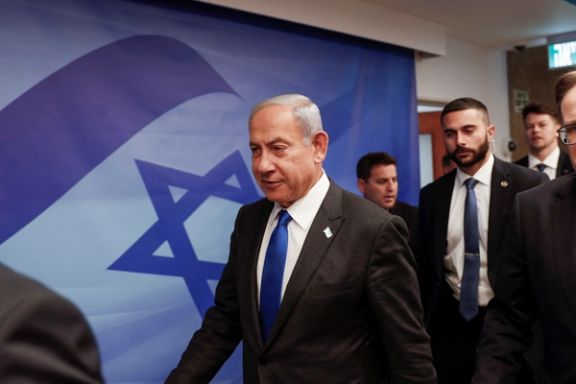
Israeli Prime Minister Benjamin Netanyahu spoke with Russian President Vladmir Putin Sunday, after Putin’s visit to the region and a trip by Iran’s president to Moscow.
Netanyahu cut short a cabinet meeting to speak with Putin on the phone an hour about Israeli hostages in Gaza and the crisis in the Middle East. He voiced “robust disapproval” of Russia’s “dangerous cooperation” with Iran, echoing concerns repeatedly voiced by the United States.
Russian and Iranian military cooperation has widened since the invasion of Ukraine. Tehran has delivered hundreds of Kamikaze drones that have been used against Ukrainian civilian and infrastructure targets. Russia is also poised to deliver advanced fighter planes to Iran and possibly receive ballistic missiles.
Criticizing Russian statements attacking Israel for its military operation in Gaza, Netanyahu told Putin that any country would have responded as Israel has to the October 7 Hamas attack and the killing of more than 1,000 Israeli civilians and the taking of hostages.
Netanyahu reportedly asked Putin to use his influence to help the 138 remaining hostages, including pressure on the Red Cross to pay humanitarian visits to the captives.
Putin traveled to the United Arab Emirates and Saudi Arabia this week and returned to Moscow to receive Iranian President Ebrahim Raisi. The two held talks for three hours on Thursday and discussed the Middle East crisis. Iran and Qatar are pushing for a ceasefire in Gaza, that Israel and the United States say would simply help Hamas to survive and lead to more crises in the future. It is not clear if Putin’s diplomatic meetings were an important part of what he discussed with Netanyahu.
In the meantime, there was a serious flare up of fighting between the Lebanese Hezbollah and Israeli forces on the border of the two countries. Hezbollah said it had launched explosive drones at an Israeli command position on Sunday and extensive Israeli air strikes hit south Lebanon.
The Israeli army said "suspicious aerial targets" had crossed from Lebanon and two were intercepted. Two Israeli soldiers were moderately wounded, and several others lightly injured from shrapnel and smoke inhalation, it said.
Israeli fighter jets carried out "an extensive series of strikes on Hezbollah terror targets in Lebanese territory", it said.
Although Hezbollah was initially expected to join the war to help Hamas by dividing Israeli forces, it has stayed out of large-scale hostilities, launching occasional and limited attacks on Israeli forces near the border. It has not fired any of its tens of thousands of missiles at Israel civilian targets.
Hezbollah’s cautious behavior follows Iran’s reluctance to directly get involved in military hostilities to help Hamas. Tehran has tried to shake off accusations that it greenlighted the Hamas attack, but its proxies have launched nearly 100 attacks against US and Israeli targets, in addition to attacks on commercial and military vessels in the Red Sea.
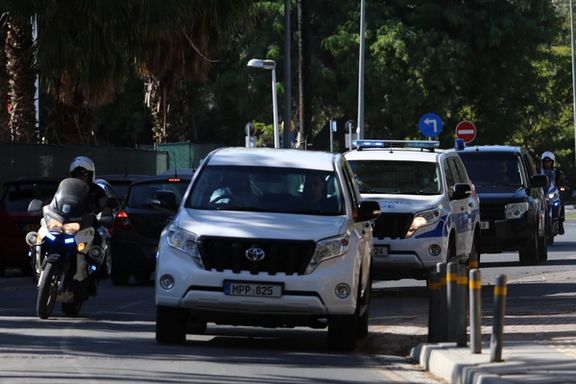
Two Iranians have been detained in Cyprus for questioning over suspected planning of attacks on Israeli citizens living in Cyprus, a Cypriot newspaper reported on Sunday.
The two individuals were believed to be in the early stages of gathering intelligence on potential Israeli targets, the Kathimerini Cyprus newspaper said without citing sources.
The paper added that the Iranians were political refugees in contact with a person linked to the Iranian Revolutionary Guard.
A senior Cyprus official declined to comment, citing policy on issues concerning national security.
Barely a 40-minute flight from Israel, Cyprus is a popular holiday and investment destination for thousands of Israelis.
Also on Sunday, Israeli Prime Minister Benjamin Netanyahu said the Israeli intelligence service Mossad helped Cyprus foil an Iranian-ordered attack against Israelis and Jews on the island, saying such plots were on the rise since the Gaza war erupted.
Israel is "troubled" by what it sees as Iranian use of Turkish-controlled northern Cyprus "both for terrorism objectives and as an operational and transit area," the statement added.
Netanyahu also said in June that an Iranian attack against Israeli targets in Cyprus had been thwarted. Iran has been implicated in many assassinations, kidnappings and terror attacks abroad against dissidents and opponents.
In the past, Israel and Cyprus have worked together to foil Iranian attacks on Israelis. Two years ago, an Azeri national with a Russian passport, who was acting on behalf of the Iranian Revolutionary Guards, was arrested by Cypriot intelligence services. The hitman was hired to kill an Israeli businessman.
Earlier this year, the IRGC accused Israel of assassinating its military adviser Milad Haydari with an airstrike in Syria, vowing to retaliate.
(With reporting by Reuters)